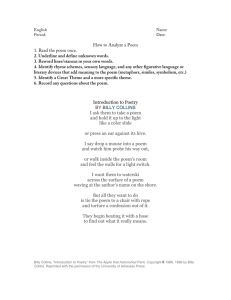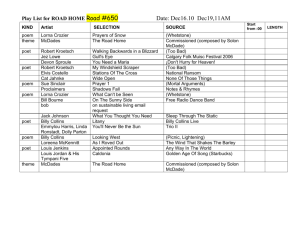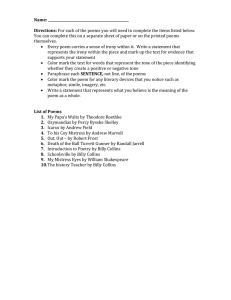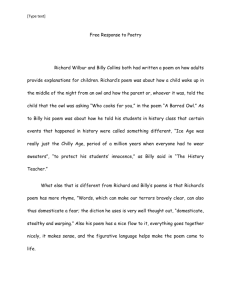Watching Words Work Assignment
advertisement
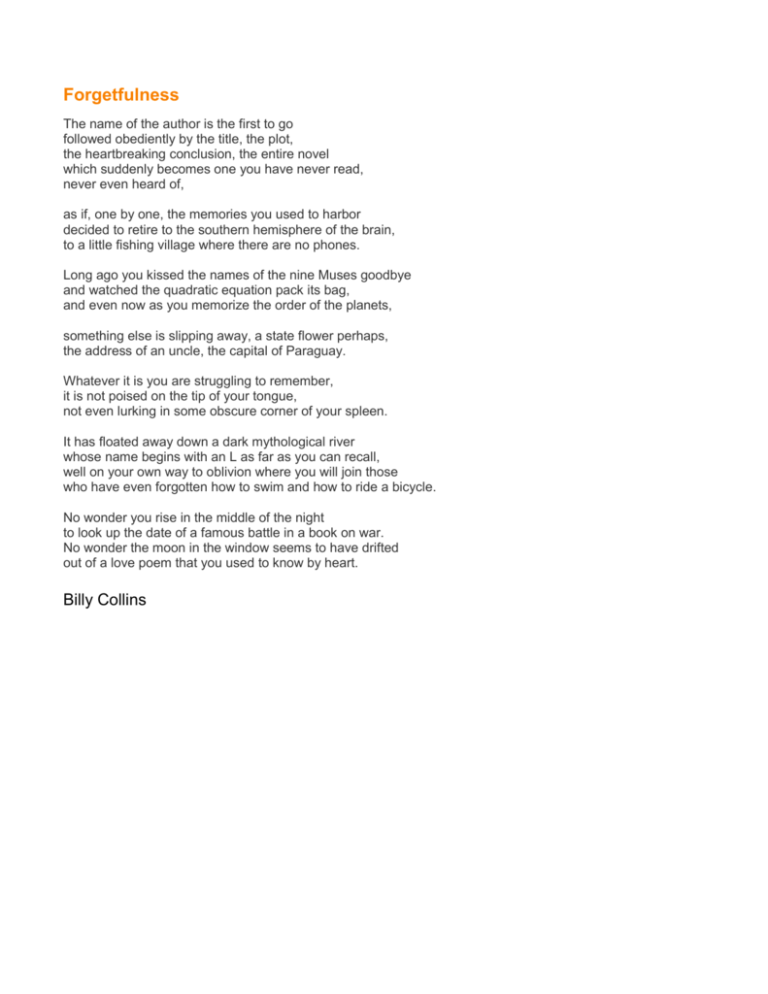
Forgetfulness The name of the author is the first to go followed obediently by the title, the plot, the heartbreaking conclusion, the entire novel which suddenly becomes one you have never read, never even heard of, as if, one by one, the memories you used to harbor decided to retire to the southern hemisphere of the brain, to a little fishing village where there are no phones. Long ago you kissed the names of the nine Muses goodbye and watched the quadratic equation pack its bag, and even now as you memorize the order of the planets, something else is slipping away, a state flower perhaps, the address of an uncle, the capital of Paraguay. Whatever it is you are struggling to remember, it is not poised on the tip of your tongue, not even lurking in some obscure corner of your spleen. It has floated away down a dark mythological river whose name begins with an L as far as you can recall, well on your own way to oblivion where you will join those who have even forgotten how to swim and how to ride a bicycle. No wonder you rise in the middle of the night to look up the date of a famous battle in a book on war. No wonder the moon in the window seems to have drifted out of a love poem that you used to know by heart. Billy Collins The Names – Billy Collins Yesterday, I lay awake in the palm of the night. A soft rain stole in, unhelped by any breeze, And when I saw the silver glaze on the windows, I started with A, with Ackerman, as it happened, Then Baxter and Calabro, Davis and Eberling, names falling into place As droplets fell through the dark. Names printed on the ceiling of the night. Names slipping around a watery bend. Twenty-six willows on the banks of a stream. In the morning, I walked out barefoot Among thousands of flowers Heavy with dew like the eyes of tears, And each had a name -Fiori inscribed on a yellow petal Then Gonzalez and Han, Ishikawa and Jenkins. Names written in the air And stitched into the cloth of the day. A name under a photograph taped to a mailbox. Monogram on a torn shirt, I see you spelled out on storefront windows And on the bright unfurled awnings of this city. I say the syllables as I turn a corner -Kelly and Lee, Medina, Nardella, and O'Connor. When I peer into the woods, I see a thick tangle where letters are hidden As in a puzzle concocted for children. Parker and Quigley in the twigs of an ash, Rizzo, Schubert, Torres, and Upton, Secrets in the boughs of an ancient maple. Names written in the pale sky. Names rising in the updraft amid buildings. Names silent in stone Or cried out behind a door. Names blown over the earth and out to sea. In the evening -- weakening light, the last swallows. A boy on a lake lifts his oars. A woman by a window puts a match to a candle, And the names are outlined on the rose clouds -Vanacore and Wallace, (let X stand, if it can, for the ones unfound) Then Young and Ziminsky, the final jolt of Z. Names etched on the head of a pin. One name spanning a bridge, another undergoing a tunnel. A blue name needled into the skin. Names of citizens, workers, mothers and fathers, The bright-eyed daughter, the quick son. Alphabet of names in a green field. Names in the small tracks of birds. Names lifted from a hat Or balanced on the tip of the tongue. Names wheeled into the dim warehouse of memory. So many names, there is barely room on the walls of the heart. *This poem is dedicated to the victims of September 11 and to their survivors. The Only Day In Existence The early sun is so pale and shadowy, I could be looking up at a ghost in the shape of a window, a tall, rectangular spirit looking down at me in bed, about to demand that I avenge the murder of my father. But the morning light is only the first line in the play of this day-the only day in existence-the opening chord of its long song, or think of what is permeating the thin bedroom curtains as the beginning of a lecture I will listen to until it is dark, a curious student in a V-neck sweater, angled into the wooden chair of his life, ready with notebook and a chewed-up pencil, quiet as a goldfish in winter, serious as a compass at sea, eager to absorb whatever lesson this damp, overcast Tuesday has to teach me, here in the spacious classroom of the world with its long walls of glass, its heavy, low-hung ceiling. Billy Collins Watching Words Work Directions: Read all three poems and pick the one where the words work the best for you—more readily paint pictures, draw up some kind of emotion or logical thought, etc. For the one poem: 1. Choose ten images and write them out on a separate sheet of paper (or type them). 2. Under each line, explain why you chose it—what works for you and why? 3. Reword the line 3 different ways to create your own with a similar meaning or emotion or thought. a. In rewording the line, you may be writing a response to the author of the poem responding in agreement or disagreement or simply with another thought. b. In rewording the line, you may be writing something a similar meaning—trying to recreate the author’s meaning/feeling with your own wording (your similes and metaphors). c. In rewording the line, you may be writing as if the line were a springboard for another thought—as if the line suddenly reminded you of something you needed to think about or do. d. In rewording the line…the possibilities are endless 4. Take 4 lines from your own story and reword them in 3 different ways to evoke feelings, ideas, or images in the way the poem did.


